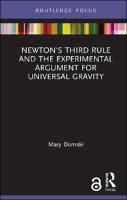Newton's Third Rule and the Experimental Argument for Universal Gravity
Proposal review
Abstract
This book provides a reading of Newton’s argument for universal gravity that is focused on the evidence-based, "experimental" reasoning that Newton associates with his program of experimental philosophy. It highlights the richness and complexity of the Principia and also draws important lessons about how to situate Newton in his natural philosophical context. The book has two primary objectives. First, it defends a novel interpretation of the third of Newton’s four Rules for the Study of Natural Philosophy – what the author terms the Two-Set Reading of Rule 3. Second, it argues that this novel interpretation of Rule 3 sheds additional light on the differences between Newton’s experimental philosophy and Descartes’s "hypothetical philosophy," and that it also illuminates how the practice of experimental philosophy allowed Newton to make a universal force of gravity the centerpiece of his explanation of the system of the world. Newton’s Third Rule and the Experimental Argument for Universal Gravity will be of interest to researchers and advanced students working on Newton’s natural philosophy, early modern philosophy, and the history of science.
Keywords
Descartes; early modern experimental philosophy; hypothetical philosophy; Isaac Newton; Mary Domski; one-set reading; Principia; third rule; two-set reading; universal gravity; universal qualitiesDOI
10.4324/9781003184256ISBN
9781000449419, 9781032020365, 9781003184256, 9781032026220, 9781000449419Publisher
Taylor & FrancisPublisher website
https://taylorandfrancis.com/Publication date and place
2022Imprint
RoutledgeSeries
Routledge Focus on Philosophy,Classification
Western philosophy from c 1800
History of science


 Download
Download